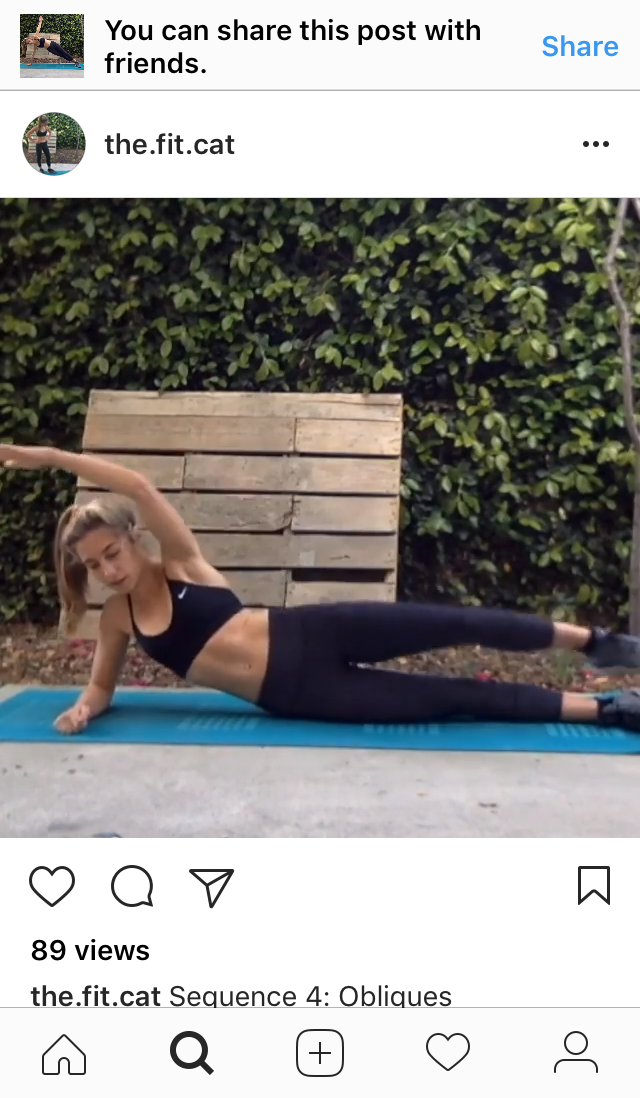The Quad: Analyzing the pros and cons of ‘fitspiration’ on social media

Fitness Instagram accounts can help people new to working out learn workout routines. (Courtesy of Catherine Achy)
By Brenda Chan
Feb. 23, 2017 4:55 p.m.
Pictures and videos of UCLA students hitting personal records on the deadlift or bench press appear whenever I go through my “explore” tab on Instagram. Phrases like “fitspiration,” “fitfam” and “fitspo” are commonly found as hashtags in these posts.
If you go looking for fitness inspiration, there are plenty of articles online that rank the top fitness Instagram accounts that one should follow. Famous bodybuilder and YouTuber Matt Ogus frequently posts videos of himself lifting on his Instagram account, but most of his photos showcase the physique he has sculpted through diet and exercise.
Here on campus, some students maintain fitness Instagram accounts to help others by providing workout tips and motivation. Catherine Achy, a fourth-year geography student, created her fitness Instagram account because her friends were interested in her workout routines.
“Working out is already one of my biggest hobbies, so it is a way to document that,” Achy said.
She also shares smoothie and protein shake recipes on Instagram and has received positive feedback from friends who have tried them out.

Following another student’s fitness Instagram account may be more likely to inspire students to workout because, unlike celebrities, our peers are people we can relate to. If their goals are achievable, it’s likely ours will be too. A study consisting of graduate student participants has shown that online peer networks can actually motivate people to exercise more. Merely knowing that their peers were exercising was an incentive for them to exercise. Following these fitness Instagram accounts may motivate us to hit the gym more frequently.
[Related: Bodybuilding as an alternative method to stay fit]
While fitness Instagram accounts give their followers “fitspiration,” there are also downsides to them.
In a recent study, two groups of women were either shown fitness or travel images from Instagram. Those who were shown fitness photos reported feeling more dissatisfied with their bodies and having lower self-esteem after.
It can be difficult to not be discontent about our bodies after seeing someone post a photo of their chiseled abs. The ugly truth about social media is that it can adversely affect our self-esteem and mental health.
Achy tries to steer clear from Instagram accounts that post before-and-after progress pictures. According to Achy, these kind of photos send the message that there is something wrong with people’s bodies. Before-and-after progress pictures imply that people need to change their bodies for the purpose of aesthetics. Achy believes fitness should be about one’s health and not about the way one looks.
A focus on external beauty and physicality in fitness Instagram accounts can make them harmful, since it could lead to body image issues. In some extreme cases, eating disorders or obsession with exercise can result if practicing self-control through dieting and the idea of “no pain, no gain” are emphasized.
[Related: Social media and romanticizing of mental health issues]
Some people may have fitness Instagram accounts for the purpose of gaining more followers and, thus, popularity. A UCLA study shows that receiving likes on social media greatly activates the nucleus accumbens, which is a part of the brain that is associated with pleasure and rewards. This could lead to a vicious cycle of constantly obsessing over one’s body fat percentage and muscle definition in order to look aesthetically pleasing for Instagram photos.
Fitness Instagram accounts are beneficial for those who need fitness motivation or beginners who need workout and nutrition advice. However, social media “fitspo” does have its disadvantages. In a time where a culture of fitness is more highly visible than ever, we should not let Instagram dictate our happiness with ourselves and our bodies.


